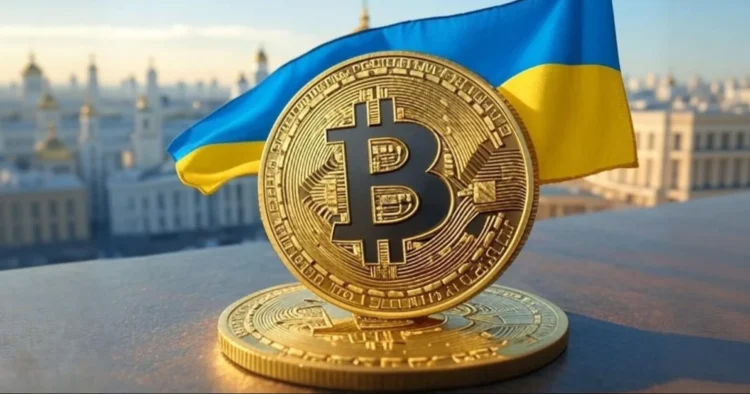Ukraine is reportedly finalizing legislation to establish a national Bitcoin reserve. This initiative, confirmed by Member of Parliament Yaroslav Zhelezniak, aims to formalise the country’s allegedly substantial Bitcoin holdings, currently estimated at 46,351 BTC, valued at nearly $4.8 billion, acquired through donations, asset seizures, and fundraising efforts during the ongoing conflict with Russia.
The proposal, developed in collaboration with Binance, aims to position Bitcoin as a strategic reserve asset, marking a significant shift in Ukraine’s financial strategy amid economic uncertainty.
However, this ambitious plan raises critical questions: Is Ukraine pioneering a visionary financial strategy that leverages digital assets for economic resilience, or is it engaging in a high-stakes political gamble fraught with volatility and regulatory challenges?
Why Is Ukraine Turning to Bitcoin?
Ukraine’s decision to pursue a national Bitcoin reserve stems from a mix of financial necessity, geopolitical pressures, and a growing global shift toward digital assets. Since Russia’s invasion in 2022, Ukraine has faced significant economic instability, its national currency has been under pressure, inflation remains high, and international aid, while helpful, has not fully stabilised its economy.
In such a volatile environment, Bitcoin is increasingly being seen as a potential hedge against financial uncertainty and a store of value that isn’t tied to traditional financial systems or fiat currencies.
Globally, Bitcoin is gaining acceptance among governments, hedge funds, and institutional investors as a decentralized asset that offers security, liquidity, and inflation resistance. For Ukraine, this growing legitimacy reinforces its decision to explore Bitcoin as a strategic reserve asset, much like countries hold gold or foreign currencies.
Ukraine also stands out as one of the most crypto-friendly nations in Eastern Europe. In 2022, it adopted crypto laws, making it easier to regulate and integrate digital assets into its economy. During the early months of the war, Ukraine’s government received millions of dollars in crypto donations, which were used to fund defence and humanitarian needs. These real-world use cases have made crypto a key part of Ukraine’s wartime financial resilience, further motivating its push toward a formal national reserve of Bitcoin.
The Case for Bitcoin as a Strategic Reserve
Ukraine’s exploration of a national Bitcoin reserve raises a fundamental question: Can Bitcoin offer the same level of security and strategic value as traditional reserves, such as gold or foreign fiat currencies? Advocates say yes, and here’s why.
The Case for Bitcoin as a Strategic Reserve
- Hedge Against Inflation and Currency Instability
- Financial Sovereignty from Traditional Institutions
- Community Support and Innovation Appeal
- Potential Long-Term Gains
Hedge Against Inflation and Currency Instability
One of the strongest arguments in favour of Bitcoin as a strategic reserve asset is its potential as a hedge against inflation and local currency devaluation. Ukraine’s economy has suffered from war-related disruptions, weakening the hryvnia and exposing vulnerabilities in its fiat-based reserve system.
Unlike fiat currencies, which can be printed at will, Bitcoin has a fixed supply of 21 million coins, making it resistant to inflation. As traditional financial systems strain under geopolitical and monetary pressures, Bitcoin offers a decentralized alternative that isn’t subject to government manipulation or monetary policy shifts.
Financial Sovereignty from Traditional Institutions
Bitcoin enables value storage and transfers outside the oversight of global institutions, such as the International Monetary Fund (IMF) or the SWIFT banking network. For countries like Ukraine, which are entangled in international politics and subject to sanctions, this could offer critical financial independence.
In times of geopolitical conflict or diplomatic strain, having a reserve that’s not frozen or controlled by external entities may prove to be a national advantage. It gives Ukraine greater autonomy to manage its finances and support its people without relying solely on the conditions or constraints imposed by international lenders.
Community Support and Innovation Appeal
Ukraine has already witnessed firsthand how the global crypto community can mobilise quickly. In 2022, crypto donations poured in to support the Ukrainian government and NGOs within hours of setting up digital wallets.
By officially adopting Bitcoin into its financial strategy, Ukraine could further solidify these ties with the crypto world, potentially opening doors to more decentralized financing, tech partnerships, and international goodwill. This move could also stimulate domestic innovation in the blockchain sector, attracting crypto startups and talent to help rebuild the economy.
Potential Long-Term Gains
Finally, there is the speculative, yet real, potential for long-term appreciation. Bitcoin’s value has historically trended upward over time, despite short-term volatility.
If Ukraine secures Bitcoin as a strategic reserve asset during a market lull and the price rises significantly over the next decade, the country could see immense gains that strengthen its fiscal position. This speculative upside adds another layer of appeal, especially for a country looking for high-reward strategies to rebuild and modernise its economy post-conflict.
In essence, building a Bitcoin reserve aligns with Ukraine’s broader goal of becoming a digitally advanced, sovereign economy. But while the potential benefits are compelling, the next step lies in managing the substantial risks involved.
The Risks and Political Implications for Bitcoin as a Strategic Reserve
While Ukraine’s ambition to build a national Bitcoin reserve might seem forward-thinking, it also opens the door to several substantial risks, financial and geopolitical. These concerns highlight the complexity of adopting such an unconventional asset at a national level.
The Risks and Political Implications for Bitcoin as a Strategic Reserve
- Bitcoin’s Extreme Volatility
- Relying on a Speculative Asset
- Potential Fallout with International Allies
- Geopolitical Messaging in a Time of War
Bitcoin’s Extreme Volatility
One of the biggest risks associated with Bitcoin is its notorious price volatility. While it has demonstrated impressive long-term growth, Bitcoin can experience double-digit percentage losses or gains in a single day. This unpredictability makes it a risky choice for a strategic reserve meant to offer financial stability.
If Ukraine were to hold a significant portion of its reserves in Bitcoin and the market crashed, as it did in 2018 or mid-2022, the country’s financial footing could become even more fragile during already difficult times.
Relying on a Speculative Asset
Bitcoin is still a relatively young asset, largely driven by investor sentiment rather than fundamentals like GDP, interest rates, or earnings. Unlike gold or U.S. Treasury bonds, it doesn’t have a long-standing track record of stability or crisis resilience.
Basing a national financial strategy on such a speculative asset could backfire, especially during periods of global economic turbulence or political instability. Ukraine’s economy, already strained by war, might not be able to absorb the financial shock if Bitcoin were to enter a prolonged bear market.
Potential Fallout with International Allies
Relying on Bitcoin as a strategic reserve asset could raise concerns among Ukraine’s traditional financial partners, such as the International Monetary Fund (IMF), the World Bank, or the European Union. These institutions may view the move as risky or irresponsible, especially if it’s seen as undermining monetary policy norms or global financial governance.
This could affect Ukraine’s ability to secure future aid, debt relief, or favourable lending terms, resources it heavily depends on during wartime and reconstruction.
Geopolitical Messaging in a Time of War
The optics of embracing Bitcoin as a strategic reserve asset during an ongoing war with Russia could also be controversial. On one hand, it could signal resilience and innovation. On the other hand, it might be perceived as desperation or an attempt to bypass conventional financial scrutiny.
Furthermore, if Bitcoin is used to attract donations or bypass sanctions, critics might argue that Ukraine is stepping into legal grey areas, potentially complicating diplomatic relations with Western allies.
While Bitcoin offers unique opportunities, its adoption at the national reserve level carries serious implications. For Ukraine, the challenge lies in balancing innovation with caution, ensuring that the pursuit of financial independence doesn’t jeopardise economic stability or global alliances.
Can This Strategy Be Sustained?
Ukraine’s consideration of building a national Bitcoin reserve raises a critical question: can this financial strategy be effectively and sustainably managed over time? While the idea may appear innovative, the long-term viability depends heavily on Ukraine’s ability to build the right infrastructure, governance model, and response systems for digital asset management.
Economic and Regulatory Readiness
Ukraine has taken progressive steps in recent years toward embracing cryptocurrency. In 2022, it legalised crypto operations and has worked with global exchanges and blockchain companies to facilitate wartime donations.
However, managing a national reserve of Bitcoin requires far more than legal acceptance; it demands a mature financial framework. This includes tax rules, anti-money laundering (AML) regulations, custodial solutions, and cross-border payment protocols that are not yet fully developed in Ukraine.
Governance, Custody, and Transparency Concerns
Holding Bitcoin at the state level introduces new governance challenges. Who will control the private keys? How will transactions be monitored, and who ensures that the reserves are used responsibly and transparently?
The risk of internal mismanagement or even cyberattacks increases when dealing with digital assets. Unlike gold or fiat reserves held in central banks, Bitcoin requires secure custody solutions, such as cold wallets and multi-signature authorisation processes.
Ukraine will need to establish transparent mechanisms for public oversight and external auditing to maintain trust, both domestically and internationally.
Liquidity and Crisis Management
Another major concern is whether Bitcoin can serve its purpose in times of economic crisis. While it’s globally tradable, converting large amounts of Bitcoin into fiat on short notice without impacting market prices can be challenging, especially during a downturn.
Liquidity may dry up, or exchange access could be restricted during periods of geopolitical tension or sanctions. Moreover, if Bitcoin prices are low during a crisis, the real purchasing power of the reserve could be severely diminished, rendering it ineffective for emergency financial interventions.
Final Thoughts
Ukraine’s plan to create a national Bitcoin reserve is both bold and risky. It shows a desire to modernise its financial system and reduce reliance on traditional institutions, especially in the face of war and economic instability.
But the risks are real. Bitcoin remains a highly volatile asset, and managing it as a national reserve requires robust systems for security, regulation, and transparency. If not handled properly, the financial strategy could backfire.
Still, this move could set a powerful example. If Ukraine succeeds, other countries, particularly those facing similar challenges, may follow suit. If it fails, it will serve as a cautionary lesson about the dangers of placing too much faith in crypto. Whether it works or not, Ukraine’s decision could reshape the world’s perception of crypto, national reserves, and financial independence.
Disclaimer: This article is intended solely for informational purposes and should not be considered trading or investment advice. Nothing herein should be construed as financial, legal, or tax advice. Trading or investing in cryptocurrencies carries a considerable risk of financial loss. Always conduct due diligence.
If you would like to read more articles like this, visit DeFi Planet and follow us on Twitter, LinkedIn, Facebook, Instagram, and CoinMarketCap Community.
Take control of your crypto portfolio with MARKETS PRO, DeFi Planet’s suite of analytics tools.”





















